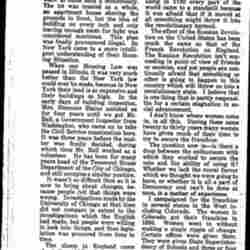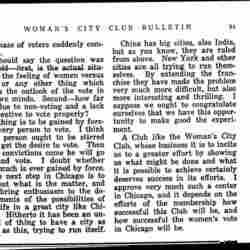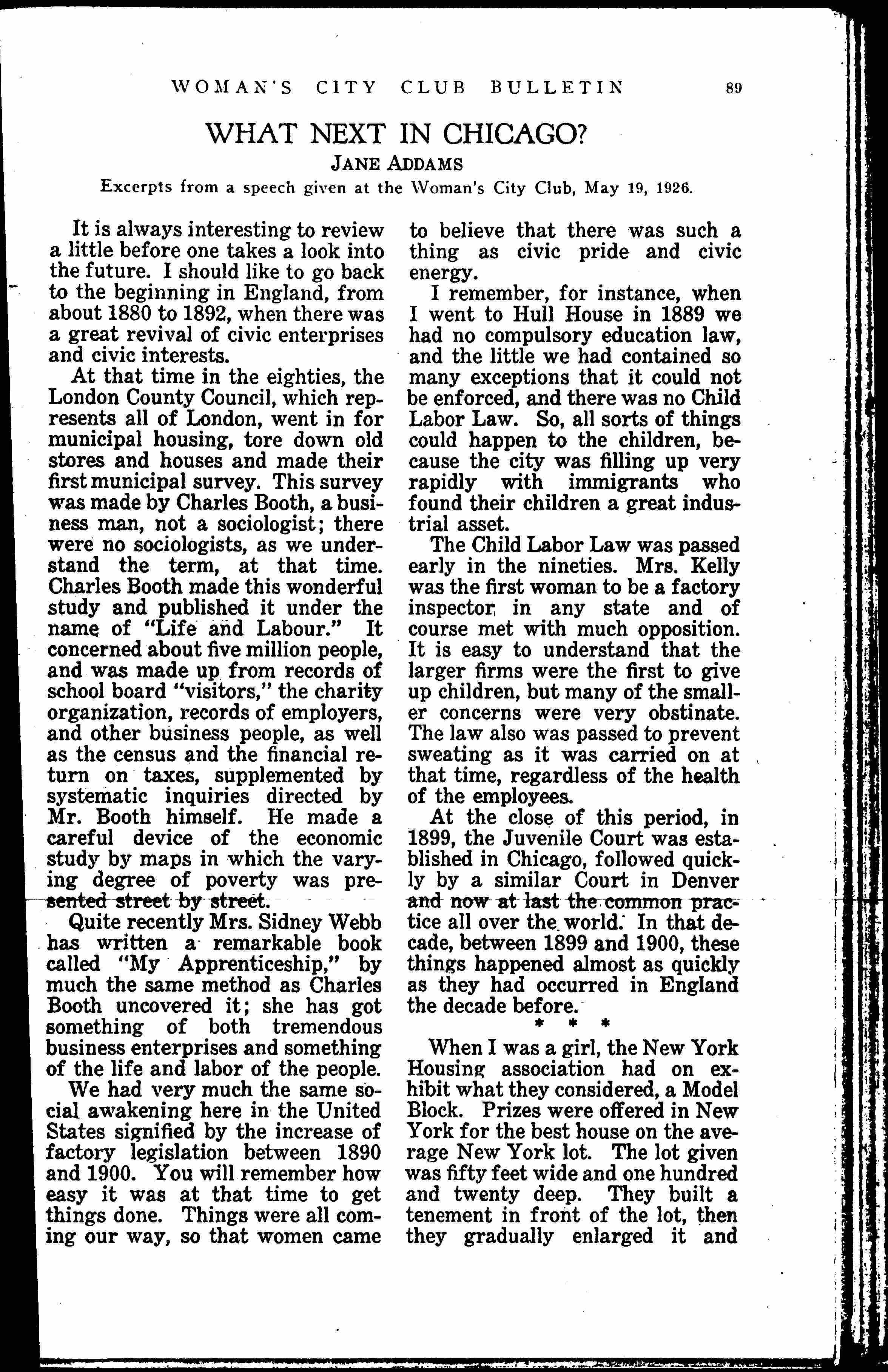WHAT'S NEXT IN CHICAGO?
JANE ADDAMS
Excerpts from a speech given at the Woman's City Club, May 19, 1926.
It is always interesting to review a little before one takes a look into the future. I should like to go back to the beginning in England, from about 1880 to 1892, when there was a great revival of civic enterprises and civic interests.
At that time in the eighties, the London County Council, which represents all of London, went in for municipal housing, tore down old stores and houses and made their first municipal survey. This survey was made by Charles Booth, a business man, not a sociologist; there were no sociologists, as we understand the term, at that time. Charles Booth made this wonderful study and published it under the name of "Life and Labour." It concerned about five million people, and was made up from records of school board "visitors," the charity organization, records of employers, and other business people, as well as the census and the financial return on taxes, supplemented by systematic inquires directed by Mr. Booth himself. He made a careful device of the economic study by maps in which the varying degree of poverty was presented street by street.
Quite recently Mrs. Sidney Webb has written a remarkable book called "My Apprenticeship," by much the same method as Charles Booth uncovered it; she has got something of both tremendous business enterprises and something of the life and labor of the people.
We had very much the same social awakening here in the United States signified by the increase of factory legislation between 1890 and 1900. You will remember how easy it was at that time to get things done. Things were all coming our way, so that women came to believe that there was such a thing as civic pride and civic energy.
I remember, for instance, when I went to Hull House in 1889 we had no compulsory education law, and the little we had contained so many exceptions that it could not be enforced, and there was no Child Labor Law. So, all sorts of things could happen to the children, because the city was filling up very rapidly with immigrants who found their children a great industrial asset.
The Child Labor Law was passed early in the nineties. Mrs. [Kelley] was the first woman to be a factory inspector in any state and of course met with much opposition. It is easy to understand that the larger firms were the first to give up children, but many of the smaller concerns were very obstinate. The law also was passed to prevent sweating as it was carried on at that time, regardless of the health of the employees.
At the close of this period, in 1899, the Juvenile Court was established in Chicago, followed quickly by a similar Court in Denver and now at last the common practice all over the world. In that decade, between 1899 and 1900, these things happened almost as quickly as they had occurred in England the decade before.
When I was a girl, the New York Housing association had on exhibit what they considered, a Model Block. Prizes were offered in New York for the best house on the average New York lot. The lot given was fifty feet wide and one hundred and twenty deep. They built a tenement in front of the lot, then they gradually enlarged it and [page 2] brought it to the small street in the back for there are no alleys in New York. This model was presented in Paris, and the Housing Commission could not believe anyone would want to build such a monstrosity. The lot was treated as a whole, an apartment house sharing the grounds in front, but the idea of building on every inch and only leaving enough room for light was considered monstrous. This plan was finally pronounced illegal. So New York came to a more intelligent understanding of their Housing Situation.
When our Housing Law was passed in Illinois, it was very much better than the New York law could ever be made, because in New York their land is so expensive and their buildings so high. In the early days of building inspection, Mrs. Emmons Blaine assisted us for four years until we got Mr. Ball, a Government Inspector from Washington, who came on to take the Civil Service examination here. It was three years before the matter was finally decided, during which time Mr. Ball worked as a volunteer. He has been for many years head of the Tenement House Department of the City of Chicago, and still occupies a similar position.
It wasn't so difficult then as it is now to bring about changes, because people felt that things were wrong. Investigations made by the University of Chicago at that time did not compare in extent to the investigations which the English had made, but people were willing to look into things, and thus legislation was procured from time to time.
The slump in England came about the middle of the nineties, and we got our slump about 1905. From then until the opening of the war certainly things went less easily than before. Then the war came, and what affects us even more than the war, the Russian Revolution. It is a fact of history that during revolutionary times each outside nation is afraid of being affected by the revolution. At the time of the French Revolution along in 1792 every part of the world came to a standstill because it was afraid that if it moved at all something might throw it into the revolutionary turmoil.
The effect of the Russian Revolution on the United States has been much the same as that of the French Revolution on England. The Russian Revolution isn't succeeding in point of view of friends or enemies, and yet people are continually afraid that something or other is going to happen in this country which will throw us into a revolutionary state. I believe that is one thing that is partly responsible for a certain stagnation in social advancement.
I don't know where women come in, in all this. During these same twenty to thirty years many women have given much of their time to try to secure the franchise.
The question now is -- is there a drop between the enthusiasm with which they worked to secure the vote and the ability of using it? Whether we lack the moral fervor which we thought we were going to have, or whether it is all a part of Democracy and can't be done at once, is a matter of experience.
I campaigned for the franchise in several states in the West including Colorado. The women in Colorado got their franchise in 1893. Women went in without making a single ripple of change. Certain offices were given them. They were given State Superintendency of Schools and three or four other things, and although women did these things well the State situation as a whole remained very much as it was before women came in. Perhaps it is true, that existing conditions can't be modified and can't be changed by a [page 3] new mass of voters suddenly coming in.
I should say the question was two-fold -- first, is the actual situation, the feeling of women versus men, or say any other thing which queers the outlook of the vote in our own minds. Second -- how far is it due to [nonvoting] and a lack of incentive to vote properly?
Nothing is to be gained by forcing every person to vote. I think every person ought to be stirred up to get the desire to vote. Then when convictions come he will go out and vote. I doubt whether very much is ever gained by force.
The next step in Chicago is to find out what is the matter, and then bring enthusiasm to the developments of the possibilities of city life in a great city like Chicago. Hitherto it has been an unheard of thing to have a city as large as this, trying to run itself.
China has big cities, also India, but as you know, they are ruled from above. New York and other cities are all trying to run themselves. By extending the franchise they have made the problem very much more difficult, but also more interesting and thrilling, I suppose we ought to congratulate ourselves that we have this opportunity to make good the experiment.
A Club like the Woman's City Club, whose business it is to incite us to a greater effort by showing us what might be done and what it is possible to achieve certainly deserves success in its efforts. I approve very much such a center in Chicago, and it depends on the efforts of the membership how successful this Club will be, and how successful the women's vote in Chicago will be.






















Comments